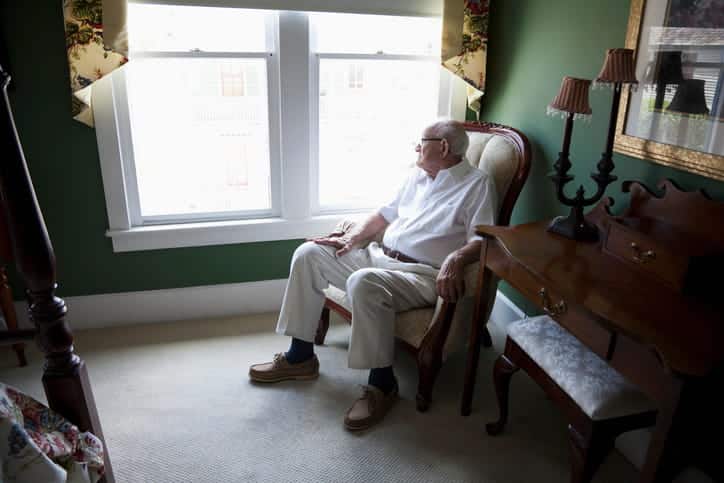Seniors 65 and older currently account for 18% of the U.S. population, with 62 million seniors in America today. Projections indicate this number will rise to 84 million in the next 30 years.

As the population ages, society must adapt to address the unique needs of seniors. Aging increases the risk of physical health issues, including the following:
- Alzheimer’s
- Dementia
- Diabetes
- Heart disease
- Osteoarthritis
- Osteoporosis
- Pneumonia
Seniors also have a high risk of falls and related injuries.
Physical health issues aren’t the only risks to seniors’ health. Social isolation affects approximately 25% of seniors, and elderly loneliness jeopardizes seniors by increasing the risks of severe health issues, including the following:
- Anxiety
- Dementia
- Depression
- Heart disease
- Premature death
- Stroke
- Suicide
If you’re a senior struggling with loneliness or a family member of a senior who’s socially isolated, there are some steps you can take to combat elderly isolation. Let’s look at ways to help seniors thrive in their golden years.
How Can You Reduce Loneliness Among the Elderly?
Addressing loneliness begins with realizing a senior is lonely. Your instincts may tell you to consider spending more time with them, find ways to increase their social opportunities, or suggest moving to an assisted living facility. These options have value, but you must consider what’s best for the individual’s overall health and well-being when determining how to help them combat loneliness.
Consider Health Issues
Some health issues may cause loneliness. Seniors who are surrounded by peers or family members may still be lonely and depressed if they can’t communicate with others. Hearing loss affects 33% of people over 60. A hearing test can confirm if your senior family member has hearing loss, which would affect their ability to communicate. Hearing aids may resolve the issue, enabling them to socialize with family and friends.
Seniors with mobility issues may also be reluctant to attend social functions. Teaching them how to use assistive devices is one way to eliminate this barrier and increase their ability to enjoy activities with friends and family.
Increase Your Interactions
If you can, increasing quality time with your senior family member, like having them live with you, may be a fantastic choice. If not, you can also schedule time throughout the week to visit them, call them, or have your family video chat with them.
Support Their Friendships
You can help combat loneliness by supporting elderly friendships and finding ways to ensure your senior family member can visit with their close friends or interact with them through technology. Teach your older family members how to use the video chat function on a tablet or cell phone and program their contacts into the device so they can quickly reach their friends and family.
Emotional Support Animals
Emotional support animals provide companionship and support. If you have a senior family member who’s fond of dogs, you can consider an emotional support dog trained to meet their needs.
How Do You Address Social Isolation in the Elderly?
Social isolation applies when people aren’t near others they can interact with. A senior who remains in their home while friends move to the best assisted living facility in the area may struggle with isolation. Mobility issues can also isolate those unable to leave home for appointments, essentials, and social outings.
You might consider addressing isolation by moving a senior family member into your home. This may increase opportunities for regular interactions, but it’s crucial to consider your family routine. Are you and your spouse at work all day? Are your children in school? Do you have hectic evening and weekend schedules filled with family activities, homework, and child care? In that case, your senior family member may still be lonely, and they may also feel depressed because they left their home and familiar environment behind.
You may consider addressing social isolation by moving your senior family member to an assisted living facility. These facilities promote social interactions with other residents and offer outings and planned activities onsite. There are many benefits for seniors ready to move to a senior care facility; however, some residents struggle with homesickness after moving to a facility, and you may need to help them overcome this so they can adapt to their new surroundings.
How Do You Help Someone Who Is Elderly and Socially Isolated?
Helping elderly persons who are socially isolated begins with addressing the issue and your concerns. Your efforts to reduce their isolation will likely fail if your family member isn’t willing to cooperate, so it’s crucial you use an informed approach when discussing options with them and getting their input.
In addition to moving in with family, moving to an assisted living facility, or getting a roommate, you can address social isolation without changing their living environment by investing in personal care.
Personal care aids provide crucial support for seniors. Hiring a personal care aid is a great way to ensure seniors can shop, visit friends, and attend community events. A personal care aid also provides transportation and can become a crucial part of a senior’s social circle, reducing their sense of isolation and loneliness.
Related: Tips for Dealing with Homesickness in Assisted Living
How Haven Health Can Help

Contact us to find out how we can help your senior family member by providing a safe environment with social opportunities and the personal and emotional support they need to make the most of their golden years.
Sources:
Loneliness and Social Isolation Linked to Serious Health Conditions. (2021).
Older Adult Fall Prevention. (2023).
Schaeffer, K. (2024). U.S. centenarian population is expected to quadruple over the next 30 years.
Seniors and Hearing Loss. (2023).